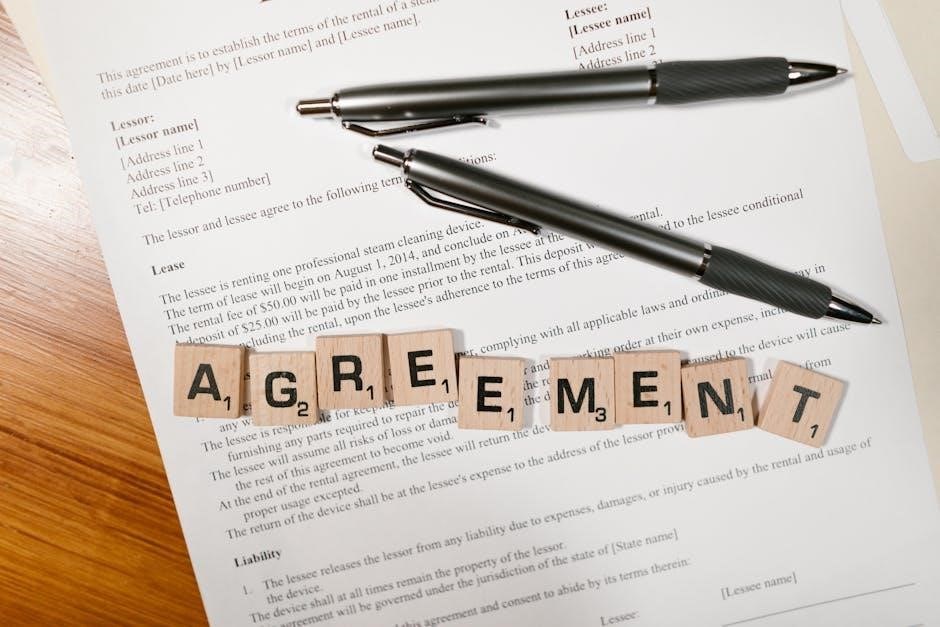
reiwa commercial lease agreement pdf
The REIWA Commercial Lease Agreement is a legally binding document for commercial properties in Western Australia, excluding retail premises. It outlines lease terms, rent, and renewal options, ensuring clarity and compliance with local laws while protecting both landlords and tenants. The agreement is available as a downloadable PDF, offering a standardized and legally compliant framework for commercial property transactions.
Overview of the REIWA Commercial Lease Agreement
The REIWA Commercial Lease Agreement is a standardized legal document designed for commercial tenancies in Western Australia. It provides a comprehensive framework for outlining the terms and conditions between landlords and tenants. The agreement covers essential aspects such as property details, lease duration, rent payments, and termination clauses. It ensures compliance with Western Australian commercial tenancy laws and offers clarity for both parties. The document is widely used due to its balance of protecting the interests of landlords and tenants. Available in PDF and digital formats, it simplifies the leasing process while maintaining legal integrity. This agreement is a valuable resource for ensuring smooth and legally compliant commercial tenancy transactions.
Importance of Using the REIWA Commercial Lease Agreement
The REIWA Commercial Lease Agreement is essential for establishing clear and legally binding terms between landlords and tenants in Western Australia. It ensures both parties understand their rights and obligations, reducing the risk of disputes. The agreement complies with state-specific laws, providing a reliable framework for commercial tenancies. By using this standardized document, landlords and tenants can avoid misunderstandings and potential legal issues. It also saves time and resources by offering a pre-drafted, professional format. The agreement balances the interests of both parties, ensuring fairness and transparency. Its widespread recognition by legal professionals further enhances its credibility and practicality for commercial property transactions. Regular updates ensure it remains relevant and compliant with current legislation.
Key Sections of the REIWA Commercial Lease Agreement
The REIWA Commercial Lease Agreement outlines essential details such as tenant and landlord obligations, property descriptions, lease duration, rent payment terms, and termination conditions.
Parties Involved in the Lease
The REIWA Commercial Lease Agreement clearly outlines the parties involved in the lease, ensuring transparency and accountability. These parties typically include the landlord (lessor) and tenant (lessee), with their full legal names, addresses, and contact details provided. The agreement may also reference agents acting on behalf of either party, such as property managers or legal representatives. Clearly defining the parties involved is crucial for enforcing the terms of the lease and resolving disputes. The document often requires signatures from all parties to confirm their agreement to the terms. This section ensures that all individuals or entities bound by the lease are properly identified, reducing ambiguity and ensuring legal enforceability.
Property Description and Lease Term
The REIWA Commercial Lease Agreement provides a detailed property description and lease term to ensure clarity and mutual understanding between the landlord and tenant. The property description includes the address, type of premises (e.g., office, retail, or warehouse), and any included fixtures or equipment. The lease term specifies the commencement and expiry dates, as well as the duration of the tenancy. This section also outlines conditions for lease renewal or extension, if applicable. Clearly defining the lease term and property details helps prevent disputes and ensures both parties are aligned on the scope of the agreement. Accuracy in this section is vital for enforcing the lease and maintaining a smooth landlord-tenant relationship.
Rent and Payment Terms
The REIWA Commercial Lease Agreement outlines clear rent and payment terms to establish a fair financial arrangement between the landlord and tenant. It specifies the initial rent amount, payment frequency (e.g., monthly or quarterly), and the acceptable payment methods. The agreement also details due dates, late payment penalties, and any applicable grace periods. Additionally, it addresses rent reviews or increases, including the timing and methodology for calculating adjustments, such as CPI increases or market rent valuations. This section ensures transparency and accountability, protecting both parties by clearly defining financial obligations and expectations throughout the lease period. Properly structured payment terms help maintain a stable and predictable cash flow for both landlords and tenants.
Security Deposit and Bond Requirements
The REIWA Commercial Lease Agreement includes provisions for a security deposit or bond to protect the landlord against potential damages or unpaid rent. The agreement specifies the amount of the deposit, which must be held in accordance with Western Australian tenancy laws. It outlines the payment methods and how the deposit will be held, typically through a trust account or a government-approved bond scheme. The lease also details the conditions under which the deposit may be claimed, such as property damage or lease breaches. Additionally, it explains the process for refunding the deposit at the end of the lease, including the required inspections and timelines for resolution. Proper handling of the bond ensures accountability and fairness for both parties, minimizing disputes over financial obligations.
Lease Renewal and Termination Clauses
The REIWA Commercial Lease Agreement outlines clear provisions for lease renewal and termination, ensuring both parties understand their rights and obligations. The agreement specifies the conditions under which the lease can be renewed, including the required notice period for exercising a renewal option. It also details the circumstances under which either party can terminate the lease, such as breach of contract or mutual agreement. The document includes timelines for providing notice of termination and outlines the steps to be taken if the lease is not renewed. Additionally, it addresses the implications of early termination, including potential penalties or financial consequences. These clauses provide clarity and protect the interests of both landlords and tenants, ensuring a fair and structured process for ending or extending the lease agreement.

Legal Requirements and Compliance
The REIWA Commercial Lease Agreement ensures compliance with Western Australian tenancy laws and the Australian Consumer Law, providing a legally binding framework for both landlords and tenants.
Western Australian Commercial Tenancy Laws
The REIWA Commercial Lease Agreement is designed to comply with Western Australian commercial tenancy laws, primarily governed by the Commercial Tenancy (Retail Shops) Agreements Act 1985. This legislation outlines the rights and obligations of landlords and tenants for retail shop leases. It ensures transparency, fairness, and clarity in commercial tenancy arrangements; The laws require landlords to provide tenants with a Disclosure Statement before entering into a lease, detailing key terms such as rent, lease duration, and permitted use of the premises. Additionally, the Act addresses dispute resolution mechanisms and provides protections for tenants, such as restrictions on unilateral lease terminations. Understanding these laws is crucial for both parties to navigate the lease process effectively.
Disclosure Requirements for Landlords
Disclosure Requirements for Landlords
Under Western Australian commercial tenancy laws, landlords are required to provide tenants with a Disclosure Statement before entering into a lease agreement. This document outlines essential details about the property, including its condition, lease terms, and any known issues. The REIWA Commercial Lease Agreement includes a Disclosure Statement to ensure compliance with these requirements. Landlords must disclose information about the premises, such as its intended use, any existing leases, and details of outgoings like rates and taxes. Failure to provide accurate and complete disclosure can lead to penalties or disputes. This requirement ensures transparency and fairness, protecting both parties by clearly outlining expectations and responsibilities from the outset. It is a critical step in maintaining a positive landlord-tenant relationship.
Compliance with Australian Consumer Law
The REIWA Commercial Lease Agreement ensures compliance with the Australian Consumer Law (ACL), which promotes fairness and transparency in commercial dealings. The ACL requires landlords to avoid misleading or deceptive conduct and ensure all terms are clear and reasonable. The lease agreement is designed to prevent unfair contract terms that may disadvantage tenants. It aligns with ACL principles by providing balanced terms and conditions, ensuring both parties understand their obligations. Compliance with ACL safeguards against breaches that could lead to legal action. This ensures the lease reflects fair business practices, fostering trust and cooperation between landlords and tenants. The REIWA agreement is regularly updated to meet ACL standards, providing a reliable framework for commercial tenancies.

Benefits of the REIWA Commercial Lease Agreement
The REIWA Commercial Lease Agreement provides balanced protection for landlords and tenants, ensuring clear terms and minimizing disputes. It offers a comprehensive, legally compliant framework, promoting fair and efficient commercial property management.
Protection for Landlords and Tenants
The REIWA Commercial Lease Agreement provides robust protection for both landlords and tenants by outlining clear rights and responsibilities. For landlords, it ensures security through binding terms, protecting their property and rental income. Tenants are safeguarded against unfair practices, such as sudden rent increases or unjustified lease terminations. The agreement includes clauses that prevent misuse of the property and ensure timely rent payments. It also outlines procedures for handling disputes, offering a fair resolution process. By creating a legally binding contract, it minimizes risks for both parties, fostering a balanced and professional relationship. This mutual protection ensures a stable and transparent commercial tenancy arrangement, compliant with Western Australian laws.
Clarity in Lease Terms and Conditions
The REIWA Commercial Lease Agreement is designed to provide clear and concise terms and conditions, ensuring both landlords and tenants fully understand their obligations; The agreement outlines specific details such as lease duration, rent payment schedules, and responsibilities for property maintenance. This clarity helps prevent misunderstandings and disputes by setting clear expectations from the outset. The document also defines roles and liabilities, ensuring transparency in financial and operational aspects of the tenancy. By avoiding ambiguous language, the agreement fosters a straightforward and professional relationship between parties. This level of detail ensures that all aspects of the lease are easily comprehensible, reducing the likelihood of conflicts and promoting a smooth tenancy experience.
Minimizing Disputes Through Clear Agreements
The REIWA Commercial Lease Agreement is structured to minimize disputes by ensuring all terms are clearly defined and mutually understood. By outlining detailed clauses for rent, responsibilities, and lease duration, the agreement reduces ambiguity. This clarity ensures that both landlords and tenants are aware of their obligations, minimizing potential conflicts. The document also includes provisions for dispute resolution, providing a framework for addressing issues amicably. Clear agreements foster a collaborative relationship, as all parties are aligned on expectations. This reduces the likelihood of misunderstandings and promotes a harmonious tenancy. The REIWA form ensures transparency, making it easier for both sides to uphold their commitments without contention.

Negotiating the Lease Agreement
Negotiation involves discussing lease terms to suit both parties, ensuring clarity and mutual understanding, and addressing any specific needs or concerns.

Understanding Lease Negotiation Strategies
Negotiating a REIWA Commercial Lease Agreement requires a strategic approach to ensure both parties achieve a balanced and mutually beneficial agreement. Effective communication and understanding of each party’s needs are crucial. Tenants may seek flexible terms, such as rent reductions or longer lease periods, while landlords may prioritize security and stability. Key strategies include researching market rates to determine fair rent, understanding lease terms, and identifying potential areas for compromise. Both parties should aim for clarity and transparency to avoid future disputes. By understanding negotiation strategies, landlords and tenants can create a lease agreement that aligns with their goals and fosters a positive landlord-tenant relationship.
Key Points to Consider During Negotiation
When negotiating a REIWA Commercial Lease Agreement, several key points must be considered to ensure a fair and balanced agreement. These include the lease term, rent, and payment terms, as well as security deposits and disclosure requirements. Tenants should seek clarity on maintenance responsibilities and insurance obligations, while landlords may focus on ensuring timely rent payments and property upkeep. Both parties should also discuss termination clauses and any conditions that could lead to lease termination. Understanding these elements helps prevent disputes and ensures both parties are satisfied with the final agreement. Proper negotiation fosters a positive landlord-tenant relationship and a legally sound lease document.
Seeking Professional Advice
Engaging legal and real estate professionals is crucial when preparing or negotiating a REIWA Commercial Lease Agreement. Legal experts can provide tailored advice to ensure compliance with Western Australian tenancy laws and Australian Consumer Law. They can also help interpret complex clauses, such as lease renewal and termination conditions, to protect the interests of both landlords and tenants. Real estate agents can offer market insights to ensure rent and lease terms are competitive and fair. Seeking professional advice minimizes risks and ensures all parties understand their obligations. This step is particularly vital for first-time landlords or tenants to avoid potential legal or financial pitfalls.

Completing the REIWA Commercial Lease Agreement
Completing the REIWA Commercial Lease Agreement requires precise preparation of all details, ensuring compliance with legal standards, and obtaining necessary signatures for proper execution.
Step-by-Step Guide to Filling Out the Form
To complete the REIWA Commercial Lease Agreement accurately, start by identifying the correct form version and ensuring all parties involved are aware of their responsibilities. Begin by filling in the landlord’s and tenant’s full legal names, along with their contact details. Next, provide a detailed description of the leased property, including the address and any specific inclusions like fixtures or equipment. Clearly outline the lease term, including the commencement and expiry dates, and specify the agreed-upon rent amount and payment terms. Detail any bond requirements and attach supporting documents, such as a signed rent schedule or disclosure statements. Ensure all clauses are thoroughly reviewed, and obtain signatures from both parties in the designated areas. Finally, retain copies for both landlord and tenant, ensuring legal compliance and clarity in the agreement.
Required Documentation and Attachments
When completing the REIWA Commercial Lease Agreement, specific documentation must be attached to ensure compliance and clarity. The lease agreement itself must be accompanied by a signed rent schedule, which outlines the rental amount, payment terms, and due dates. Additionally, a completed bond lodgement form is required if a security bond is agreed upon, detailing how the bond will be managed and returned. Landlords must also provide a disclosure statement, outlining the property’s condition, any known defects, and the tenant’s rights. Attachments may include written agreements for property repairs or the removal of fixtures. Ensure all documents are signed, dated, and securely attached to avoid delays in the process.
Signing and Executing the Agreement
The REIWA Commercial Lease Agreement must be signed by both the landlord and tenant to be legally binding; Each party should review the document thoroughly before signing. Witnesses are not required, but it is recommended to ensure transparency. Once signed, the agreement is considered executed, and both parties are obligated to adhere to its terms. A copy of the signed lease should be provided to both parties for their records. The landlord must also ensure the lease complies with Western Australian laws, including the requirement for the lease to be in writing. Digital signatures are accepted if using platforms like REI Forms Live, streamlining the process while maintaining legal validity.

Digital Tools for Managing the Lease Agreement

The REIWA Commercial Lease Agreement can be efficiently managed using digital tools like REI Forms Live, which offers electronic signatures, secure storage, and easy document sharing.

Using REI Forms Live for Digital Documentation
REI Forms Live is a digital platform designed to streamline the management of the REIWA Commercial Lease Agreement; It allows users to create, edit, and store lease documents electronically, reducing paperwork and enhancing efficiency. The platform provides pre-built templates for the REIWA Commercial Lease Agreement, ensuring compliance with legal requirements. Key features include real-time collaboration, digital signatures, and secure storage. Landlords and tenants can access documents anytime, anywhere, promoting transparency and organization. REI Forms Live also minimizes errors by automating calculations and ensuring all fields are completed accurately. This tool is particularly beneficial for managing multiple properties or tenants, as it maintains a centralized and searchable records system. By leveraging REI Forms Live, users can ensure their lease agreements are up-to-date and easily accessible, simplifying lease management and reducing administrative burdens.
Benefits of Electronic Signatures
Electronic signatures offer numerous advantages for the REIWA Commercial Lease Agreement, enhancing efficiency and convenience. They enable rapid document execution, eliminating delays associated with traditional paper-based processes. Accessibility is improved as parties can sign from any location with internet access, reducing the need for in-person meetings. Enhanced security features, such as encryption, ensure the integrity and authenticity of the agreement. By reducing paper use, electronic signatures promote environmental sustainability. Legally binding in Western Australia, they provide compliance assurance. Cost savings are achieved through reduced physical documentation needs. Additionally, digital storage simplifies organization and record-keeping, making future access and audits easier. Overall, electronic signatures streamline the leasing process, benefiting both landlords and tenants.
Secure Storage and Sharing of Lease Documents
Secure storage and sharing of lease documents are critical for maintaining confidentiality and organization; Digital platforms provide encrypted storage, ensuring that sensitive information remains protected. Access can be controlled, allowing only authorized parties to view or edit the documents. Sharing lease agreements via secure links reduces the risk of unauthorized access and ensures compliance with privacy laws. Automated backups and version control features prevent data loss and maintain document integrity. Integration with cloud-based systems enables easy access from any device, while audit trails provide transparency in document interactions. This approach minimizes physical storage needs and enhances collaboration between landlords, tenants, and agents, ensuring that all parties have secure and reliable access to lease documents.

Resources and Support
Access official REIWA resources, including guides and checklists, to navigate the commercial lease agreement. Legal consultations and expert advice are available for tailored support and clarification.
REIWA Members’ Access to Resources
REIWA members gain exclusive access to comprehensive resources, including the REIWA Commercial Lease Agreement PDF, tailored to streamline property transactions. These resources provide detailed guides, templates, and legal insights to ensure compliance and efficiency. Members can access training materials, webinars, and updates on tenancy laws, helping them stay informed. Additionally, REIWA offers expert advice through its support team, addressing specific queries and scenarios. This dedicated support ensures members can navigate complex leasing processes with confidence. By leveraging these tools, REIWA members maintain professionalism and uphold best practices in commercial property management. Regular updates and new resources are added to reflect changes in legislation, keeping members well-prepared for evolving market demands. This exclusive access underscores REIWA’s commitment to member success and industry excellence.
Seeking Legal and Professional Assistance
Engaging legal and professional experts is crucial when dealing with the REIWA Commercial Lease Agreement PDF to ensure all terms are tailored to specific needs. Legal practitioners can provide interpretations of complex clauses and advise on potential risks or liabilities. Professional assistance ensures compliance with Western Australian tenancy laws and Australian Consumer Law. Consultants can also help negotiate terms, resolve disputes, and clarify responsibilities for both landlords and tenants. Additionally, experts can review the lease agreement for completeness and accuracy, ensuring all parties’ interests are protected. Seeking professional advice is particularly important for unique or high-value commercial properties, where customized terms may be necessary. This step helps prevent future misunderstandings and ensures a smooth transaction process for all involved.
Online Communities and Forums for Support
Engaging with online communities and forums provides valuable support for understanding and managing the REIWA Commercial Lease Agreement PDF. Platforms like the REIWA website, social media groups, and industry-specific forums offer opportunities to connect with professionals, landlords, and tenants. These spaces allow users to ask questions, share experiences, and gain insights into best practices. Members can access resources, such as sample lease agreements and checklists, to ensure compliance and avoid common pitfalls. Additionally, online forums often feature discussions on legal updates and market trends, helping users stay informed. Participating in these communities fosters collaboration and provides a network for resolving challenges related to commercial leasing in Western Australia.
Leave a Reply
You must be logged in to post a comment.